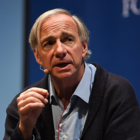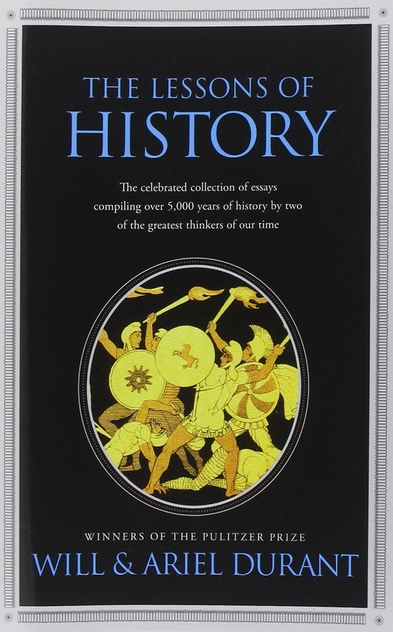
The Fullest Ray Dalio Book List: 45 Recommendations
1
like
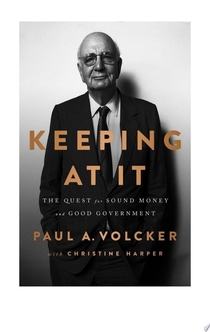
Keeping At It
At the same time, I would like to draw your attention to Paul Volcker’s great book “Keeping At It.”

The Hero with a Thousand Faces
What are your top 5 books of all time? Principles doesn't count ;)The Lessons of History by Will and Ariel Durant, Hero of a Thousand Faces by Joseph Campbell, The River Out of Eden by Richard Dawkins, The Rise and Fall of the Great Powers by Paul Kennedy--gee there are so many that are running through my mind.
See all

Tribe of Mentors
I love Tim’s book because it’s essentially a collection of great principles from people who have accomplished great things.
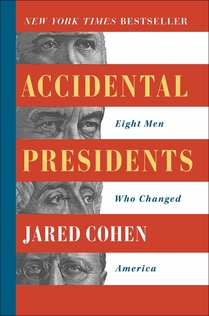
Accidental Presidents
I found “Accidental Presidents” by @JaredCohe timely and informative. As I am thinking about the next president and the challenges he or she will face, that book provides me a valuable and entertaining view of past presidents during analogous difficult times.
See all
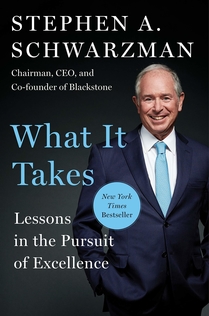
What It Takes
Two such people - @Benioffand Stephen Schwarzman - have luckily for you put out two books that let you tap into their thinking, so I suggest that you check out Marc’s book, Trailblazer, and Stephen’s book, What It Takes.

Trailblazer
Two such people - @Benioffand Stephen Schwarzman - have luckily for you put out two books that let you tap into their thinking, so I suggest that you check out Marc’s book, Trailblazer, and Stephen’s book, What It Takes.
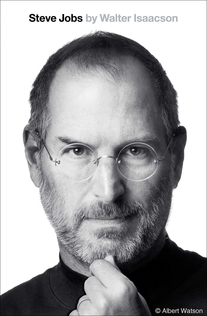
Steve Jobs
The phenomenal bestseller about Apple co-founder Steve Jobs from the author of the acclaimed biographies of Benjamin Franklin and Albert Einstein.Based on more than forty interviews with Jobs conducted over two years—as well as interviews with more than 100 family members, friends, adversaries, competitors, and colleagues—Walter Isaacson set down the riveting story of the roller-coaster life and searingly intense personality of a creative entrepreneur whose passion for perfection and ferocious drive revolutionized six industries: personal computers, animated movies, music, phones, tablet computing, and digital publishing. Isaacson’s portrait touched hundreds of thousands of readers. At a time when America is seeking ways to sustain its innovative edge and when societies around the world are trying to build digital-age economies, Jobs still stands as the ultimate icon of inventiveness and applied imagination. He knew that the best way to create value in the twenty-first century was to connect creativity with technology. He built a company where leaps of the imagination were combined with remarkable feats of engineering. Although Jobs cooperated with the author, he asked for no control over what was written. He put nothing off-limits. He encouraged the people he knew to speak honestly. He himself spoke candidly about the people he worked with and competed against. His friends, foes, and colleagues offer an unvarnished view of the passions, perfectionism, obsessions, artistry, devilry, and compulsion for control that shaped Jobs’s approach to business, the innovative products that resulted, and his legacy.
See all
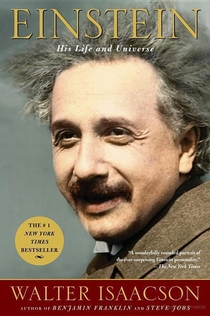
Einstein
NOW A MAJOR SERIES 'GENIUS' ON NATIONAL GEOGRAPHIC, PRODUCED BY RON HOWARD AND STARRING GEOFFREY RUSHEinstein is the great icon of our age: the kindly refugee from oppression whose wild halo of hair, twinkling eyes, engaging humanity and extraordinary brilliance made his face a symbol and his name a synonym for genius. He was a rebel and nonconformist from boyhood days. His character, creativity and imagination were related, and they drove both his life and his science. In this marvellously clear and accessible narrative, Walter Isaacson explains how his mind worked and the mysteries of the universe that he discovered. Einstein's success came from questioning conventional wisdom and marvelling at mysteries that struck others as mundane. This led him to embrace a worldview based on respect for free spirits and free individuals. All of which helped make Einstein into a rebel but with a reverence for the harmony of nature, one with just the right blend of imagination and wisdom to transform our understanding of the universe. This new biography, the first since all of Einstein's papers have become available, is the fullest picture yet of one of the key figures of the twentieth century. This is the first full biography of Albert Einstein since all of his papers have become available -- a fully realised portrait of this extraordinary human being, and great genius.Praise for EINSTEIN by Walter Isaacson:- 'YOU REALLY MUST READ THIS.' Sunday Times 'As pithy as Einstein himself.’ New Scientist ‘[A] brilliant biography, rich with newly available archival material.’ Literary Review ‘Beautifully written, it renders the physics understandable.’ Sunday Telegraph ‘Isaacson is excellent at explaining the science. ' Daily Express
See all
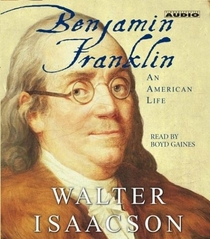
Benjamin Franklin
In this authoritative and engrossing full-scale biography, Walter Isaacson, bestselling author of Einstein and Steve Jobs, shows how the most fascinating of America's founders helped define our national character.Benjamin Franklin is the founding father who winks at us, the one who seems made of flesh rather than marble. In a sweeping narrative that follows Franklin’s life from Boston to Philadelphia to London and Paris and back, Walter Isaacson chronicles the adventures of the runaway apprentice who became, over the course of his eighty-four-year life, America’s best writer, inventor, media baron, scientist, diplomat, and business strategist, as well as one of its most practical and ingenious political leaders. He explores the wit behind Poor Richard’s Almanac and the wisdom behind the Declaration of Independence, the new nation’s alliance with France, the treaty that ended the Revolution, and the compromises that created a near-perfect Constitution.In this colorful and intimate narrative, Isaacson provides the full sweep of Franklin’s amazing life, showing how he helped to forge the American national identity and why he has a particular resonance in the twenty-first century.
See all

The Meaning of Human Existence
New York Times Bestseller Finalist for the National Book Award (Nonfiction) How did humanity originate and why does a species like ours exist on this planet? Do we have a special place, even a destiny in the universe? Where are we going, and perhaps, the most difficult question of all, "Why?" In The Meaning of Human Existence, his most philosophical work to date, Pulitzer Prize–winning biologist Edward O. Wilson grapples with these and other existential questions, examining what makes human beings supremely different from all other species. Searching for meaning in what Nietzsche once called "the rainbow colors" around the outer edges of knowledge and imagination, Wilson takes his readers on a journey, in the process bridging science and philosophy to create a twenty-first-century treatise on human existence—from our earliest inception to a provocative look at what the future of mankind portends. Continuing his groundbreaking examination of our "Anthropocene Epoch," which he began with The Social Conquest of Earth, described by the New York Times as "a sweeping account of the human rise to domination of the biosphere," here Wilson posits that we, as a species, now know enough about the universe and ourselves that we can begin to approach questions about our place in the cosmos and the meaning of intelligent life in a systematic, indeed, in a testable way. Once criticized for a purely mechanistic view of human life and an overreliance on genetic predetermination, Wilson presents in The Meaning of Human Existence his most expansive and advanced theories on the sovereignty of human life, recognizing that, even though the human and the spider evolved similarly, the poet's sonnet is wholly different from the spider's web. Whether attempting to explicate "The Riddle of the Human Species," "Free Will," or "Religion"; warning of "The Collapse of Biodiversity"; or even creating a plausible "Portrait of E.T.," Wilson does indeed believe that humanity holds a special position in the known universe. The human epoch that began in biological evolution and passed into pre-, then recorded, history is now more than ever before in our hands. Yet alarmed that we are about to abandon natural selection by redesigning biology and human nature as we wish them, Wilson soberly concludes that advances in science and technology bring us our greatest moral dilemma since God stayed the hand of Abraham.
See all

Creativity And The Brain
Creativity is a uniquely human ability highly prized and sought after, defining the excellence of individuals, corporations, and nations. In the modern era of global competition, the nurturing of creativity in oneself and others has become a major concern for the general public. Until recently, however, human creativity had been treated as a mysterious process of brain activity, since we had neither tools to measure precisely the brain activities nor the theories to analyze and synthesize creativity.The quick advancement of brain science these days — thanks largely to the development of various measurement tools such as EEG, EMG, and fMRI and to new attitudes which view the brain as a system — has enabled us to discuss creativity in the context of science.Written in an entertaining manner, the book is a modern primer on the science of creativity and would attract a wide audience — from those already versed in cognitive or brain sciences to the layman from the street.
See all

Why We Believe in God(s)
In this groundbreaking volume, J. Anderson Thomson, Jr., MD, with Clare Aukofer, offers a succinct yet comprehensive study of how and why the human mind generates religious belief. Dr. Thomson, a highly respected practicing psychiatrist with credentials in forensic psychiatry and evolutionary psychology, methodically investigates the components and causes of religious belief in the same way any scientist would investigate the movement of astronomical bodies or the evolution of life over time—that is, as a purely natural phenomenon. Providing compelling evidence from psychology, the cognitive neurosciences, and related fields, he, with Ms. Aukofer, presents an easily accessible and exceptionally convincing case that god(s) were created by man—not vice versa. With this slim volume, Dr. Thomson establishes himself as a must-read thinker and leading voice on the primacy of reason and science over superstition and religion.
See all
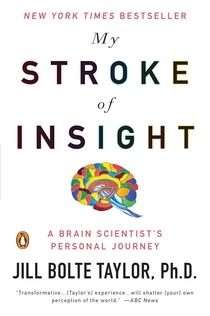
My Stroke of Insight
The astonishing international bestseller that chronicles how a brain scientist's own stroke led to enlightenment.On the morning of the 10th December 1996, Jill Bolte Taylor, a thirty-seven-year-old Harvard-trained brain scientist experienced a massive stroke when a blood vessel exploded in the left side of her brain. A neuroanatomist by profession, she observed her own mind completely deteriorate to the point that she lost the ability to walk, talk, read, write, or recall any of her life, all within the space of four hours. As the damaged left side of her brain - the rational, logical, detail and time-oriented side - swung in an out of function, Taylor alternated between two distinct and opposite realities: the euphoric Nirvana of the intuitive and emotional right brain, in which she felt a sense of complete well-being and peace; and the logical left brain, that realized Jill was having a stroke and enabled her to seek help before she was lost completely. In My Stroke of Insight: A Brain Scientist's Personal Journey, Taylor brings to light a new perspective on the brain and its capacity for recovery that she gained through the intimate experience of awakening her own injured mind. The journey to recovery took eight years for Jill to feel completely healed. Using her knowledge of how the brain works, her respect for the cells composing her human form, and an amazing mother, Taylor completely repaired her mind and recalibrated her understanding of the world according to the insight gained from her right brain that December morning.
See all
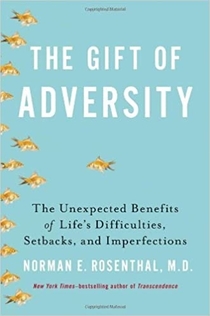
The Gift of Adversity
Now in paperback—this acclaimed book from Norman Rosenthal, the New York Times–bestselling author and research psychiatrist, shows how life’s disappointments and difficulties provide us with the lessons we need to become happier and more resilient human beings. Winner of the 2014 Nautilus Award represents “Better Books for a Better World”—the Silver Award in the category of Heroic Journeys.Adversity is an irreducible fact of life. Although we can and should learn from all experiences, both positive and negative, bestselling author Dr. Norman E. Rosenthal, believes that adversity is by far the best teacher most of us will ever encounter.Whether the adversity one experiences is the result of poor decision-making, a desire to test one’s mettle, or plain bad luck, Rosenthal believes life’s most important lessons—from the value of family to the importance of occasionally cutting corners—can be best learned from it.Running counter to society’s current prevailing message that “excellence” must always be aspired to, and failure or mistakes of any sort are to be avoided at all costs, Rosenthal shows that engaging with our own failures and defeats is one of the only ways we are able to live authentic and meaningful lives, and that each different type of adversity carries its own challenges and has the potential to yield its own form of wisdom. Using stories from his own life—including his childhood in apartheid-era South Africa, his years after suffering a violent attack from a stranger, and his career as a psychiatrist—as well as case studies and discussions with well-known figures like Viktor Frankl and David Lynch, Rosenthal shows that true innovation, emotional resilience, wisdom, and dignity can only come from confronting and understanding the adversity we have experienced. Even when life is hardest, there are meanings to be found, riches to be harvested, and gifts that can last a lifetime. Rosenthal illustrates his message through a series of compact, memorable chapters, each one drawn from episodes in the lives of his patients, colleagues, or himself, and concluded with a take-away maxim on the lesson learned.
See all

Discovering Your Personality Type
The leading experts in the field, Don Richard Riso and Russ Hudson have set the standard for determining personality type using the enneagram. Their studies of this ancient symbol and their progress in determining type with increasing accuracy are known, taught, and emulated worldwide. Discovering Your Personality Type is the essential introduction to this system, a psychological framework that can be used practically, in many aspects of daily life. This revised and updated edition features the all-new, scientifically validated Riso-Hudson Type Indicator, and has also been refined and simplified to appeal especially to beginners and anyone interested in unlocking the secrets of personality. The most reliable, most accurate, and most accessible way to identify type, the improved enneagram questionnaire helps identify fundamental character traits, revealing invaluable directions for change and growth. The profile that emerges is useful for a wide variety of purposes: professional development, education, relationships, vocational counseling, and more. Discovering Your Personality Type is the book readers need in order to begin to see the possibilties made available by understanding personality types.
See all

Who am I?
What do we want? What makes us tick? From acceptance to vengeance to curiosity, this book explains the 16 basic and universal desires that shape our behavior—and shows how the ways we prioritize them determines our personalities. Grounded in up-to-date psychological research, this book can helpparents comprehend their children’s needs and behaviorcouples understand each other betteremployers motivate their employees employees become more effective in their workYOU achieve greater satisfaction and happiness in life
See all
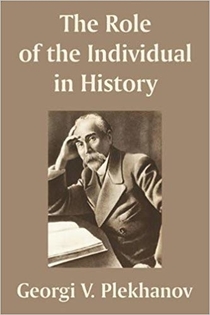
The Role of the Individual in History
The Role of the Individual in History was first published in 1898, and occupies a very prominent place among those of Plekhanov's works in which he substantiates and defends Marxism and advocates the Marxian theory of social development. Georgi Valentinovich Plekhanov (1856-1918) was one of the leaders of Russian populism and after his emigration to Western Europe in 1880 became the foremost Russian Marxist abroad. He founded in 1883, together with Pavel Axelrod, the 'Group for the Liberation of Labor', the first Russian social democratic party, and in 1900 together with Lenin the 'Iskra', the first Russian Marxist newspaper, but a few years later broke with Lenin and sided with the Mensheviks.
See all

Subliminal
In this book the author of The Drunkard's Walk and coauthor of The Grand Design (with Stephen Hawking), gives us an examination of how the unconscious mind shapes our experience of the world and how, for instance, we often misperceive our relationships with family, friends, and business associates, misunderstand the reasons for our investment decisions, and misremember important events. Your preference in politicians, the amount you tip your waiter, all judgments and perceptions reflect the workings of our mind on two levels: the conscious, of which we are aware, and the unconscious, which is hidden from us. The latter has long been the subject of speculation, but over the past two decades researchers have developed remarkable new tools for probing the hidden, or subliminal, workings of the mind. The result of this explosion of research is a new science of the unconscious and a sea change in our understanding of how the subliminal mind affects the way we live. Employing accessible explanations of the most obscure scientific subjects, the author takes us on a tour of this research, unraveling the complexities of the subliminal self and increasing our understanding of how the human mind works and how we interact with friends, strangers, spouses, and coworkers. In the process he changes our view of ourselves and the world around us.
See all
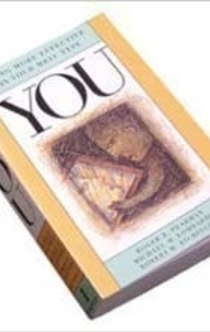
You : Being more effective in your MBTI Type
You : Being more effective in your MBTI Type by Michael M. Lombardo, Robert W. Eichinger, Roger P. Pearman

An Everyone Culture
A Radical New Model for Unleashing Your Company’s PotentialIn most organizations nearly everyone is doing a second job no one is paying them for—namely, covering their weaknesses, trying to look their best, and managing other people’s impressions of them. There may be no greater waste of a company’s resources. The ultimate cost: neither the organization nor its people are able to realize their full potential. What if a company did everything in its power to create a culture in which everyone—not just select “high potentials”—could overcome their own internal barriers to change and use errors and vulnerabilities as prime opportunities for personal and company growth?Robert Kegan and Lisa Lahey (and their collaborators) have found and studied such companies—Deliberately Developmental Organizations. A DDO is organized around the simple but radical conviction that organizations will best prosper when they are more deeply aligned with people’s strongest motive, which is to grow. This means going beyond consigning “people development” to high-potential programs, executive coaching, or once-a-year off-sites. It means fashioning an organizational culture in which support of people’s development is woven into the daily fabric of working life and the company’s regular operations, daily routines, and conversations.An Everyone Culture dives deep into the worlds of three leading companies that embody this breakthrough approach. It reveals the design principles, concrete practices, and underlying science at the heart of DDOs—from their disciplined approach to giving feedback, to how they use meetings, to the distinctive way that managers and leaders define their roles. The authors then show readers how to build this developmental culture in their own organizations.This book demonstrates a whole new way of being at work. It suggests that the culture you create is your strategy—and that the key to success is developing everyone.
See all

In Over Our Heads
If contemporary culture were a school, with all the tasks and expectations meted out by modern life as its curriculum, would anyone graduate? In the spirit of a sympathetic teacher, Robert Kegan guides us through this tricky curriculum, assessing the fit between its complex demands and our mental capacities, and showing what happens when we find ourselves, as we so often do, in over our heads. In this dazzling intellectual tour, he completely reintroduces us to the psychological landscape of our private and public lives. A decade ago in The Evolving Self, Kegan presented a dynamic view of the development of human consciousness. Here he applies this widely acclaimed theory to the mental complexity of adulthood. As parents and partners, employees and bosses, citizens and leaders, we constantly confront a bewildering array of expectations, prescriptions, claims, and demands, as well as an equally confusing assortment of expert opinions that tell us what each of these roles entails. Surveying the disparate expert "literatures," which normally take no account of each other, Kegan brings them together to reveal, for the first time, what these many demands have in common. Our frequent frustration in trying to meet these complex and often conflicting claims results, he shows us, from a mismatch between the way we ordinarily know the world and the way we are unwittingly expected to understand it. In Over Our Heads provides us entirely fresh perspectives on a number of cultural controversies--the "abstinence vs. safe sex" debate, the diversity movement, communication across genders, the meaning of postmodernism. What emerges in these pages is a theory of evolving ways of knowing that allows us to view adult development much as we view child development, as an open-ended process born of the dynamic interaction of cultural demands and emerging mental capabilities. If our culture is to be a good "school," as Kegan suggests, it must offer, along with a challenging curriculum, the guidance and support that we clearly need to master this course--a need that this lucid and richly argued book begins to meet.
See all

The Evolving Self
The Evolving Self focuses upon the most basic and universal of psychological problems—the individual’s effort to make sense of experience, to make meaning of life. According to Robert Kegan, meaning-making is a lifelong activity that begins in earliest infancy and continues to evolve through a series of stages encompassing childhood, adolescence, and adulthood. The Evolving Self describes this process of evolution in rich and human detail, concentrating especially on the internal experience of growth and transition, its costs and disruptions as well as its triumphs. At the heart of our meaning-making activity, the book suggests, is the drawing and redrawing of the distinction between self and other. Using Piagetian theory in a creative new way to make sense of how we make sense of ourselves, Kegan shows that each meaning-making stage is a new solution to the lifelong tension between the universal human yearning to be connected, attached, and included, on the one hand, and to be distinct, independent, and autonomous on the other. The Evolving Self is the story of our continuing negotiation of this tension. It is a book that is theoretically daring enough to propose a reinterpretation of the Oedipus complex and clinically concerned enough to suggest a variety of fresh new ways to treat those psychological complaints that commonly arise in the course of development. Kegan is an irrepressible storyteller, an impassioned opponent of the health-and-illness approach to psychological distress, and a sturdy builder of psychological theory. His is an original and distinctive new voice in the growing discussion of human development across the life span.
See all
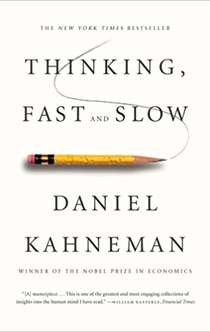
Thinking, Fast and Slow
Major New York Times bestsellerWinner of the National Academy of Sciences Best Book Award in 2012Selected by the New York Times Book Review as one of the ten best books of 2011A Globe and Mail Best Books of the Year 2011 TitleOne of The Economist's 2011 Books of the Year One of The Wall Street Journal's Best Nonfiction Books of the Year 20112013 Presidential Medal of Freedom RecipientKahneman's work with Amos Tversky is the subject of Michael Lewis's The Undoing Project: A Friendship That Changed Our MindsIn the international bestseller, Thinking, Fast and Slow, Daniel Kahneman, the renowned psychologist and winner of the Nobel Prize in Economics, takes us on a groundbreaking tour of the mind and explains the two systems that drive the way we think. System 1 is fast, intuitive, and emotional; System 2 is slower, more deliberative, and more logical. The impact of overconfidence on corporate strategies, the difficulties of predicting what will make us happy in the future, the profound effect of cognitive biases on everything from playing the stock market to planning our next vacation—each of these can be understood only by knowing how the two systems shape our judgments and decisions.Engaging the reader in a lively conversation about how we think, Kahneman reveals where we can and cannot trust our intuitions and how we can tap into the benefits of slow thinking. He offers practical and enlightening insights into how choices are made in both our business and our personal lives—and how we can use different techniques to guard against the mental glitches that often get us into trouble. Winner of the National Academy of Sciences Best Book Award and the Los Angeles Times Book Prize and selected by The New York Times Book Review as one of the ten best books of 2011, Thinking, Fast and Slow is destined to be a classic.
See all
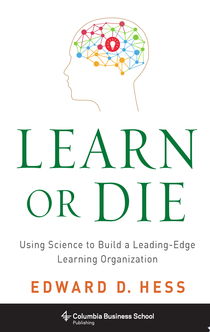
Learn or Die
To compete with today's increasing globalization and rapidly evolving technologies, individuals and organizations must take their ability to learn—the foundation for continuous improvement, operational excellence, and innovation—to a much higher level. In Learn or Die, Edward D. Hess combines recent advances in neuroscience, psychology, behavioral economics, and education with key research on high-performance businesses to create an actionable blueprint for becoming a leading-edge learning organization. Learn or Die examines the process of learning from an individual and an organizational standpoint. From an individual perspective, the book discusses the cognitive, emotional, motivational, attitudinal, and behavioral factors that promote better learning. Organizationally, Learn or Die focuses on the kinds of structures, culture, leadership, employee learning behaviors, and human resource policies that are necessary to create an environment that enables critical and innovative thinking, learning conversations, and collaboration. The volume also provides strategies to mitigate the reality that humans can be reflexive, lazy thinkers who seek confirmation of what they believe to be true and affirmation of their self-image. Exemplar learning organizations discussed include the secretive Bridgewater Associates, LP; Intuit, Inc.; United Parcel Service (UPS); W. L. Gore & Associates; and IDEO.
See all
